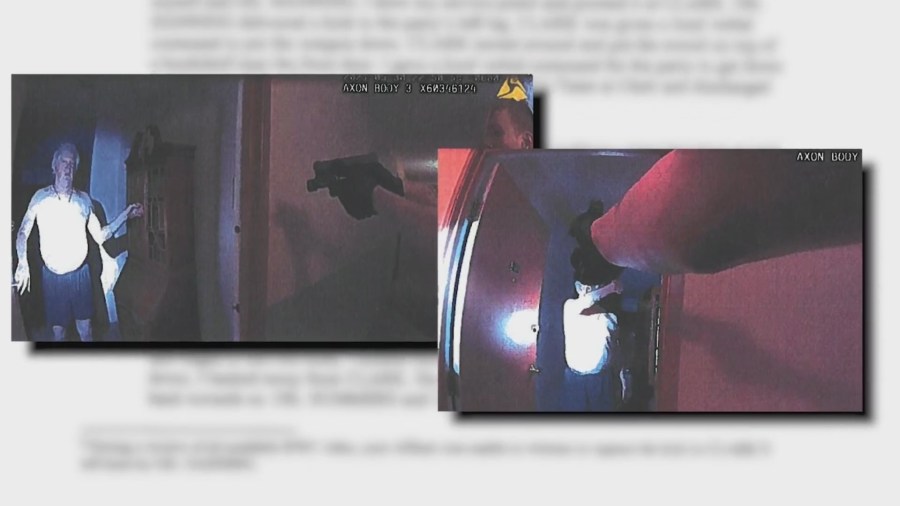IDAHO SPRINGS, Colo. (KDVR) — The decision by attorney Sarah Schielke to release body camera video from two Idaho Springs police officers on Thursday morning, could leave her facing a contempt charge.
In a brief hearing Thursday morning, Clear Creek County Judge Cynthia Jones set a contempt hearing for Aug. 12 in her Georgetown courtroom.
Jones seemed clearly annoyed that Schielke sent out a press release with links to the body cam video, plus a nine-minute edited version created by Schielke to show a condensed version of the events that led to her client Michael Clark being shocked with a stun gun.
The 35-year-old officer who used a Taser on Clark, Nicholas Hanning, was fired Thursday, July 15.
Hanning was charged with felony assault of an at-risk adult July 7, after he used a Taser on Clark without warning on the night of May 30.

Jones had previously ruled on July 13 that under a new body cam law signed by Gov. Jared Polis on July 6, the district attorney for the Fifth Judicial District had to release the video to the public by July 29. The DA was given a deadline to provide the video to Clark and his attorney one day earlier, on July 28.
It turns out that the DA provided the video to Clark and his legal team sometime last week, well ahead of the judge’s deadline.
What happened in court
But prosecutors and defense attorney Lara Jimenez, who represents Hanning, told Jones they clearly didn’t anticipate Schielke’s release of the video to the media before the district attorney and weren’t sure she followed the court’s order for what exactly could be released.
Both prosecutors and Jimenez suggested the court could find Schielke in contempt of court for how and when she released the body cam video.
Schielke was represented by civil rights attorney David Lane at the 9:30 a.m. emergency hearing Thursday morning, who insisted Schielke did nothing wrong.
While Jimenez suggested releasing the body cam video violated a court order on pretrial publicity and could hurt Hanning’s right to a fair trial, Lane noted the discussion seemed to hinge on whether Schielke “jumped the gun” by one week on releasing video the district attorney has already been ordered to release.
During the court hearing, Fifth Judicial District Attorney Heidi McCollum acknowledged her office planned to beat the July 29 deadline and was preparing to release the video to the public as soon as Friday or early next week.

McCollum said her concern was whether Schielke followed the intent of the new body cam law by editing the video instead of merely blurring faces, but perhaps more importantly, whether she violated the judge’s order barring pretrial publicity.
McCollum told FOX31 that by releasing an edited nine-minute version with typed commentary by the victim’s attorney about certain witnesses and what’s in the video, Schielke’s conduct has the ability to compromise the integrity of the case and be prejudicial to the defendant.
McCollum also expressed concern that while the witness who originally called police on the night of May 30 was blurred in the video, a unblurred mugshot of her along with prior arrest reports were included in Schielke’s edited video.
Violation of First Amendment?
But Schielke’s attorney David Lane pointed out the witness Brittany Odom, who called Idaho Springs Police on May 30 to accuse Clark of punching her in the face, was named in the criminal affidavit released by the courts on July 13. In addition, Lane noted any criminal record and mugshot that exists for Odom is public record and therefore appropriate for Schielke to share.
Lane argued that preventing Schielke from sharing information with the public that she considered relevant to why her client was improperly assaulted would violate the First Amendment and judicial rules known as “prior restraint.”

Jones said she wanted an evidentiary hearing on Aug. 12 to determine if Schielke did anything that would warrant holding her in contempt for possibly violating the judge’s order on pretrial publicity and the judge’s order on the release of body cam video.
Schielke released a statement to FOX31 on Thursday night.
“The thing about dedicating one’s life to exposing government abuse of power; the thing about fighting to hold government officials accountable; the thing about that, is that sooner or later, those officials are going to come for you,” said Schielke, who told FOX31 neither prosecutors nor Hanning’s defense attorney were able to articulate a specific example of how she violated any court orders.
“History has shown that speech is suppressed when either the speaker or the message is critical of those who enforce the law. We are here in that history today. I will never stop fighting for my client, and I will never be bullied out of my right to expose and share the truth,” Schielke said.
